Mere Breach Of Contract Would Not Constitute Cheating, Civil Dispute Given A Criminal Color: Supreme Court

A two-judge Bench of Justice S. Abdul Nazeer and Justice Krishna Murari has held that imparting criminal color to a civil dispute must be discouraged merely to take advantage of a relatively quick relief granted in a criminal case as compared to a civil dispute. The Court also held that such an exercise was nothing but an abuse of the process of law.
The Bench further held that the dispute between the parties could at best be termed as one involving a mere breach of contract and would not constitute the offence of cheating.
An appeal was preferred assailing the judgment of the Karnataka High Court wherein the Appellant had filed an appeal under Section 482 CrPC. The Appellant had challenged the FIR registered against him for the offences under Sections 406, 419, and 420 read with Section 34 IPC and to quash the proceedings before the VI Additional CMM, Bengaluru. The High Court had dismissed the appeal of the Appellant.
In this case, Respondent No. 2 had alleged that the Appellant-Company did not adhere to the terms of the Joint Development Agreement after which the Respondent revoked the General Power of Attorney. It was further alleged that the Appellant-Company had sold flats in excess of their share as agreed between the parties.
The Appellant-Company filed an application for Arbitration under Section 9 of the Arbitration Act and sought an injunction against Respondent No. 2 from creating third-party rights over the property. Respondent No. 2 had filed a criminal complaint against the Appellant Company for selling flats in excess of their share.
While the Arbitrator partly allowed the claims of the Appellant as well as Respondent No. 2. It was held by the Arbitrator that the unilateral revocation of GPA was illegal and the company had a right to effectuate sale agreements/sale deeds in terms of MoU.
It was contended by the Appellant that the case did not fulfil the necessary ingredients of the alleged offence and Respondent No. 2 had simply tried to impart a criminal color to a civil dispute.
It was further alleged that the issue of alienation of flats had not been responded to by the arbitrator since Respondent No. 2 had withdrawn his claim in respect of the said flats from arbitral proceedings with liberty to pursue his case in pending civil proceedings. Since Respondent No. 2 decided to pursue his claim by way of civil suit, therefore the criminal complaint on the same issue should be quashed.
The issues which were dealt with by the Court were –
- Whether the necessary ingredients of offences punishable under Sections 406, 419, and 420 are prima facie made out?
- Whether the sale of excess flats, even if made, amounts to a mere breach of contract or constitutes an offence of cheating?
- Whether the dispute is one of an entirely civil nature and therefore liable to be quashed?
i) First issue – If offences under Sections 406, 419, and 420 IPC prima facie made out
The Apex Court held, "By no stretch can it be concluded that the Appellants herein have deceptively or intentionally tried to sell excess flats if any, as contended by Respondent No. 2."
The Court noted that it was Respondent No. 2 who had withdrawn his prayer with respect to the selling of four excess flats by the Appellants, only to pursue the same in civil proceedings.
While relying on the facts of the case, the Court observed that clearly no cogent case regarding criminal breach of trust or cheating was made out.
Furthermore, the Court was of the opinion that at best, this could be termed as mere breach of contract.
ii) Second issue – If selling excess flats would amount to a mere breach of contract
The Bench observed, "Where the key ingredient of having a dishonest or fraudulent intent under sections 405, 419 and 420 is not made out, the case at hand, in our considered opinion is a suitable case necessitating intervention of this Court."
iii) Third Issue – If the dispute is entirely of civil nature and liable to be quashed
The Court additionally held, "Though the instant dispute certainly involves determination of issues which are of civil nature, pursuant to which Respondent No. 2 has even instituted multiple civil suits, one can by no means stretch the dispute to an extent, so as to impart it a criminal colour."
"The case therefore warrants intervention by this Court, and the High Court has erred in dismissing the petition filed by the Appellants under section 482 CrPC. We find that there has been attempt to stretch the contours of a civil dispute and thereby essentially impart a criminal color to it," observed the Court.
In the light of these observations, the Court set aside the impugned order of the Karnataka High Court and quashed the FIR and the proceedings before the VI Additional CMM, Bengaluru, in pursuance of charge sheet against the appellants for offences under Sections 406, 419, 420 read with Section 34 IPC and allowed the appeal.

